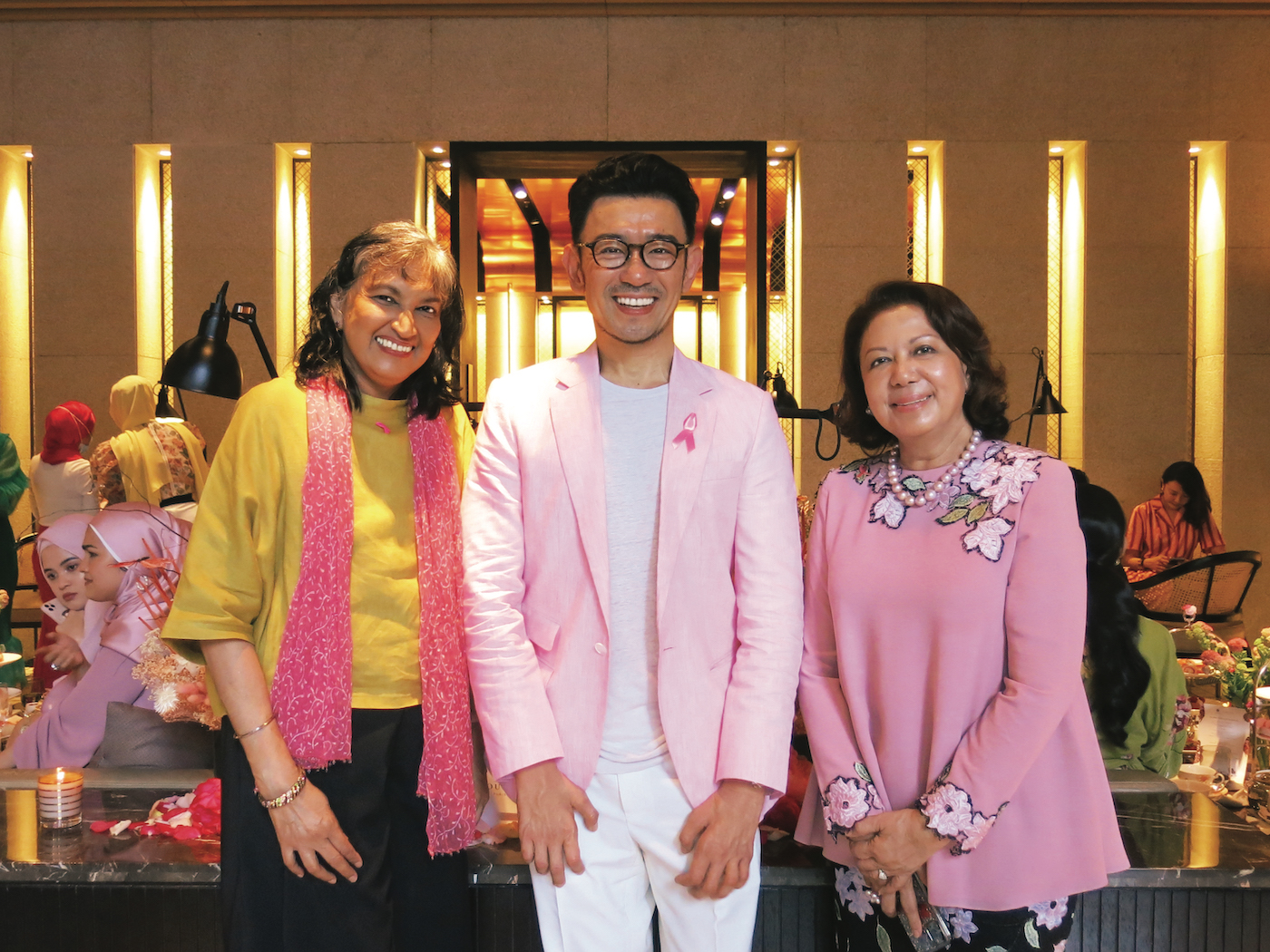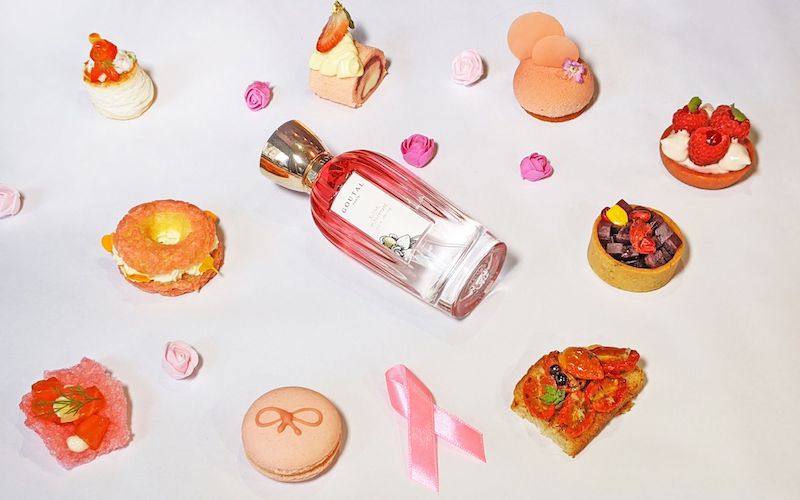
From left: Ranjit with Ken Lim, founder of Kens Apothecary, the distributor of Annick Goutal in Malaysia, and BCWA patron Puan Sri Datuk Akmal Abdul Salam at The RuMa’s Rose Pompon Afternoon Tea (Photo: The RuMa)
Ranjit Kaur says the same thing to every woman she meets: Check your breasts. To drive her point home, she may add: “I don’t have to check because I don’t have breasts.
The president of the Breast Cancer Welfare Association (BWCA) Malaysia has no qualms sharing her cancer journey. It began in 1998, when Ranjit, then 44, discovered a lump during a breast self-examination. Through the pain and strains of treatment and operations that followed the dreaded diagnosis, strong support from family and colleagues kept her going.
“I told everyone I had cancer and did not try to hide it. They could come to me and ask about my condition and I was not affected by their questions. If I hadn’t talked about it, they also would not have, but looks — ‘I think she’s going to die’ — can kill.”
Ranjit also became a volunteer with the BCWA, founded in 1986 to provide psychosocial and material support for those with breast cancer. The association helps individuals manage during and after treatment, and promotes awareness of breast health. Early detection — a mammogram can detect breast cancer before it can be felt — makes it easier to treat the disease successfully.
The trained therapist, who holds a master’s degree in community disability studies from University College London, became BCWA president in 2000. Ranjit, the public affairs manager at Tanjong plc until her retirement in 2011, now devotes her time to supporting and educating women on breast cancer and the importance of regular screening.
October, which marks Breast Cancer Awareness Month globally, sees the BCWA’s 12 staff members helping to organise talks and events to support the theme of this annual campaign: Give Hope. Save Lives.
Over the years, organisations big and small have stepped up to raise funds for or donate a percentage of sales proceeds to the association. Among those reaching out this year are Glenmarie Golf and Country Club, Bodyperfect, Four Seasons Hotel, Watsons, Isetan, the Association of British Women in Malaysia, Shangri-la Hotel, The Big Group, Wei-Ling Contemporary, Volkswagen, the American Association of Malaysia and The RuMa Hotel and Residences.
The RuMa’s Rose Pompon Afternoon Tea, a collaboration with perfume house Goutal Paris, will see 10% of sales going to BCWA. Launched in 2016, the Rose Pompon is a cult favourite of the French parfumerie founded by Annick Goutal, who died of breast cancer in 1999, aged 53.
The tea is inspired by the fragrance of Goutal’s favourite flower. On the menu are savoury and sweet treats such as Rose Caramelised Chocolate Macarons, Pink Guava Paris-brests, Strawberry Lychee Cakes and Roasted Beetroot Tarts. With every purchase, guests will receive a Rose Pompon sample, a RM50 voucher to buy the perfume at Kens Apothecary, and be eligible to get a full-sized Rose Pompon bottle.
ruma_afternoon_tea.jpg

Looking back on three decades of interaction with breast cancer patients, Ranjit says there is awareness, but a lot of hesitation too because women fear knowing they may have a problem. “It’s a form of denial.”
There is also one section of the population that is totally ignorant about the disease. “Women tell us, ‘I never knew there was something growing in me’. They tend to get busy with their lives, children and career and neglect themselves. What we want to say is: You need to make time for yourself so you are alive for those who depend on you, particularly your children.”
The social stigma associated with the disease is still very obvious, she notes. Pre-treatment, a woman might think: “I’m going to lose my hair. I have to go to work and people will know.” Ranjit turns that around by asking if she plans to tell her colleagues.
“Most of the time, they are not prepared to speak about it yet because they are going through the emotions. They feel vulnerable. and are not able to open up about what they are going through. Sometimes, we tell them our own stories.”
The stigma is intensified because cancer is associated with death and there are those who assume the woman must have done something to cause it. Some traditional communities still believe it is contagious or runs in the family.
Labelling compounds the pain. “People say, ‘She’s dying of cancer’. There’s a difference between that and ‘She’s living with cancer.’ They feel pity for you and when you accept that, you contribute to the victim mindset.”
A woman Ranjit met said she had not had sex with her husband for three years because his mother made them sleep separately. “I told her it is not contagious and got her to speak to a BCWA volunteer. Later, she told me, ‘Tonight is the night’.”
Changing mindsets is key to getting a patient to gear up to fight the disease, go through the treatment and tell herself she will recover and continue to live life like normal. That cannot happen overnight because the emotions are taking control without her realising it, Ranjit says.
Men are not spared this disease, which afflicts one in 20 women in Malaysia. Unaware of the 1% risk they face, men may ignore the lump in their breast and are more likely to see the doctor late.
Cancer treatments today are more fine-tuned than two decades ago and there is medication to reduce the side effects. Even so, the fear of recurrence is the elephant in the room: Patients have a hard time discussing that even among themselves. Cancer is a lonely experience if you do not have someone to talk to, and patients as well as family members often suffer in silence.
When Ranjit was first diagnosed and asked to meet someone to talk, the nurse she met, who had breast cancer three years earlier, cried and she ended up counselling her instead.
She then met a BCWA volunteer who gave her hope and the courage to seek treatment. “She had cancer 19 years earlier and is still alive today. I saw a great need for people to be trained to communicate with patients and give them emotional support.”
Ranjit convinced fellow volunteers at BCWA to have group counselling and talk about how they felt, what they needed and how they could make things work for themselves. From there, they started visiting hospitals to engage with women who had completed treatment, a routine that continues today.
New and improved treatments can keep people alive longer, but what about quality of life, she asks. “Many cancer patients get hope from realising it is not wrong to do the things they have been doing or find satisfaction in, whether it’s food, activities or quiet time with an aunt.”
What gives her the most satisfaction in this work is “seeing women grow from being in a vulnerable state to taking control of their lives again. It’s helping them find their way and do things for themselves when they feel lost and uncertain about the future”.
Does death dishearten her? “No, because everybody has a lifespan. All of us are going to go one day, some earlier than others.” It is unlikely that people get to tie up all the loose ends before they go, but the quality of their last few days matters, she adds.
Ranjit remembers stroking a friend’s hand — “She told me, ‘No one has touched me for a long time’ — and making her laugh the night before she died. “I feel it is very important for someone and for us to say goodbye to each other, and then let the person go.”
The Rose Pompon afternoon tea is available until Oct 31. For reservations, email seven@theruma.com.
This article first appeared on Oct 12, 2020 in The Edge Malaysia.


